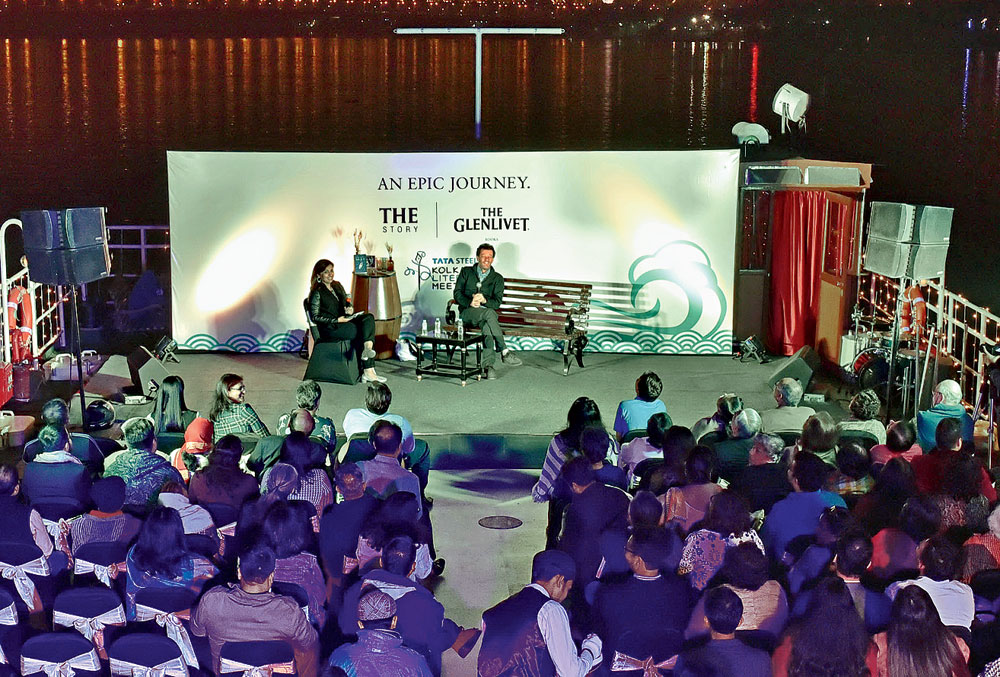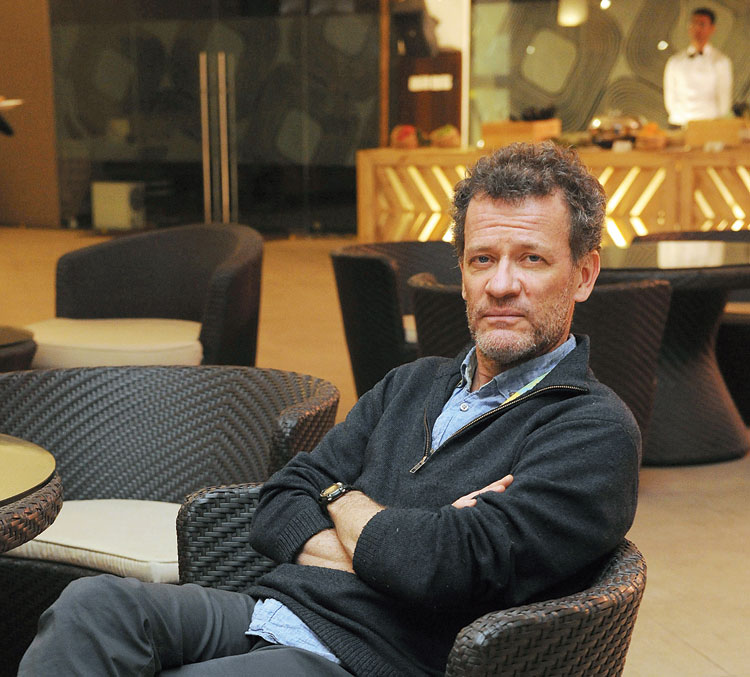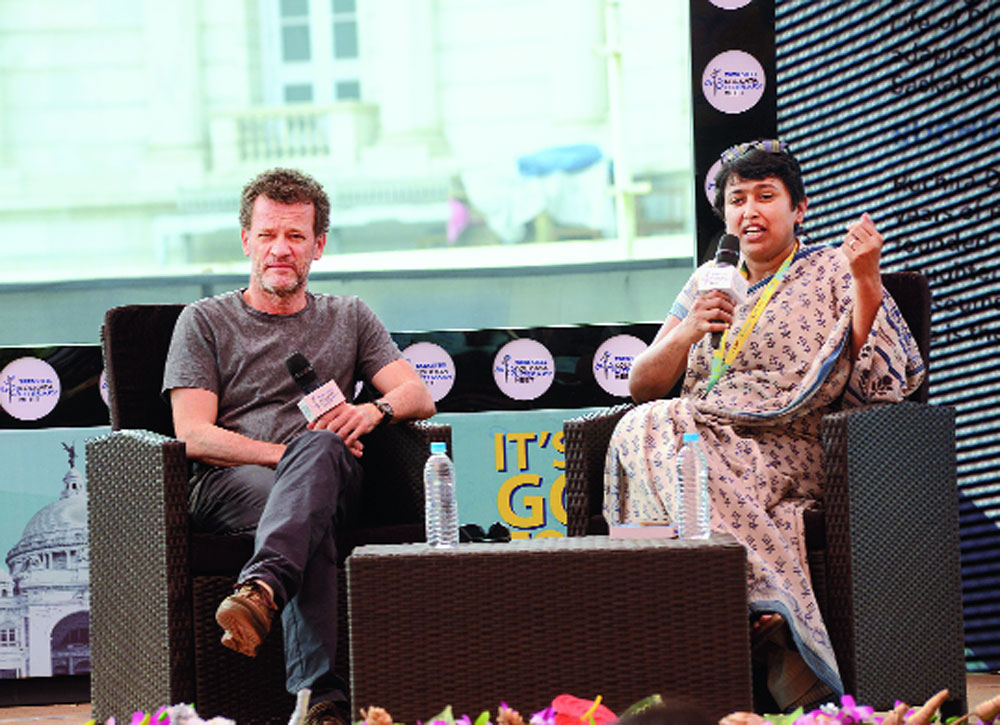His most famed work, Life of Pi (2001), which won him the Man Booker Prize for Fiction the following year, was conceptualised while he was sitting on a rock in Matheran (in Maharashtra), on one of his many trips to India. Yann Martel is a writer who means business. He has an idea which he will pursue for years before he puts his pen to paper. His last book, The High Mountains of Portugal (2016), received a tepid response but the suave author’s determination already has him on the path to his next work — a story based around the Trojan War.
Martel was in town to attend the Tata Steel Kolkata Literary Meet, in association with The Telegraph. We attended his session at the meet, joined him for coffee at Taj Bengal, and sailed on a barge on the Hooghly as he recounted his days leading up to the masterpiece that was Life of Pi.
Amidst all of this, we had him tell us, albeit at the speed of light, what it means to be a writer.
When did you know you wanted to be a writer?
Fairly late I would say by the standards of most writers, in the sense that I read, read, read, read, read. I dreamed of being an astronaut, then dreamed of being a politician, and then went to university. Second year of university, I saw this movie called Reds by Warren Beatty and it was about a man called John Reed who wrote a book called Ten Days That Shook the World, about the October Revolution.
Reed was a communist in the 1910s, who happened to be a friend of Eugene O’Neill. The summer the movie came out, I had taken a theatre course. I read plenty of plays by Eugene O’Neill and in the film, his character is played by Jack Nicholson. This is 35 years ago and this is a young, charismatic Jack Nicholson. And this was the first time I thought of a writer as a real, living thing. I had never made a link between a book and an author. And in this movie was this real, live, charismatic character whose books I had read. So I said, ‘Hah! People. Books.” And then I thought I should write, too, and I wrote some really bad plays and some really bad short stories.
I just kept writing without ever thinking that I could be a writer or that my silly scribblings could mean something. I just kept at it, waiting for life to start and it didn’t really start, but I slowly got better. I switched from plays to prose, short stories to novels, and I got better and I had a bit of luck, a fair bit of luck. A short story got published and they gave me $200 for it. Then it won a prize, then I got an agent and suddenly I was a writer. So I started when I was 19 and I took it seriously and slowly, slowly, the world took me seriously.
What is your writing process like?
I think for me the process always starts with an idea and it has to be a particular type of idea. Most story ideas are just anecdotes, lacking depth and breadth. So it has to be a striking idea, which will be followed by research. Research would lead me to more ideas and then more research. And as I am doing that, I am taking notes all the time. Like for my next novel which is around the Trojan War, I have around 600 pages of notes. These could be scenes, or parts of books that I would later want to think about. Then I take a printout and I take a pair of scissors and I cut them up into little segments. Sometimes it’s literally a sentence, or sometimes even a word.
Like for Life of Pi, a word was ‘bamboozled’ — a funny word that no one uses but is still used in India. So I print them out and I put them in little envelopes, label them and put them in order of their usage in the novel. So that forms the backbone, the skeleton of the novel. When I start writing a novel, I will open up the first envelope and that forms the crux of that portion of the book. So that’s my process — idea, research, envelopes, and then I write.
So you have the entire story charted in your mind before you even begin to put pen to paper?
Oh absolutely! I plan everything. You know, if I don’t plan it would be like asking an architect to draw up a plan without telling him what the building is. To me, form must follow function. If I don’t know where chapter 100 is going, how do I write chapter one? But it’s still a wonderful adventure because I still have to pull it off. The envelopes have bits of scenes but I haven’t really brought it together. So this Trojan War book for instance, I know how it’s starting and I know exactly how it is ending, to the last paragraph. But there is a multiplicity of ways in which I can tell what is in between. That’s the thrilling challenge of it.
Are there unplanned parts suddenly cropping up in between?
In the next one particularly... the Trojan War is quite complex. So yes, that might happen. I go, ‘All right, this feels good, this feels good, okay what do I do now?’ Then I have to think. Life of Pi is a very linear novel that way and it was very easy to write. I did two, two-and-a-half years of research, and few years of writing and rewriting and rewriting and rewriting and it just flowed.
How was writing The High Mountains of Portugal different from writing Life of Pi, especially after abandoning the project. What made you go back to it?
There was something about it! I am very interested in looking at how we cope with adversity because that’s a great thing in life. Happy people don’t create art. It is when you are unhappy that you need tools and coping mechanisms.
I was interested in the idea of adversity, so I set three characters in three stages of suffering and three capacities to believe (in The High Mountains of Portugal). There is absence of capacity; part three was about presence, somebody who is full of capacities, and the middle is where you aspire for absence but you are bedevilled by presence, which is the state for most of us — we want to believe in something but we test it. So I wanted to explore that and I wasn’t going back to Life of Pi. Even the next novel is completely different, as was Beatrice and Virgil, which was about the holocaust and its repercussions; a different creative mechanism and a different creative purpose.
You have written about home in The High Mountains of Portugal... being homeward bound and being home. What is your idea of home?
It’s the place where you feel you belong. It is not necessarily a place, it could be a state of mind. In fact, it is often a state of mind that expresses itself in a place. But a place can be ruined for you and your state of mind can change over the course of time.
Immigrants are a perfect example. You are here and then you move to Canada and then you slowly switch over. Your children switch over more quickly and you switch over more slowly perhaps. So it’s an evolving thing but it always starts with something in the mind. Homesickness is a terrible thing. It is the inability to create a home. There is a discrepancy between your home and your mind, and home and the place where you are and that’s homesickness. When the two are in sync, then you really feel at home.
When you write, do you have someone on your mind? The perfect audience?
No, just an intelligent, curious reader but no one in particular. Obviously I am the first reader. I write and then I read and think, ‘Oh! I like this.’
During research, how do you separate the politics from historical accounts?
Well the Trojan War for instance, the first account goes back to 700BC. So there was no politics except for maybe academic politics. But that’s the best part of fiction — you create your own world and let in and exclude what you want. In the sense that you don’t get rid of politics, you just add new politics to it.
You frequently use animals in your fiction. What drives you towards them?
Just because they are a good symbolic vehicle. The animal is not only a part of the story but it also has a symbolic resonance. People often look at an animal in a story and say, ‘What does it mean?’, and that’s very useful for a storyteller. In the Trojan War book there will be a few animals but more on the side of things. For us humans who idolise animals and see them with a sense of wonder, that kind of a character is very useful. It helps lift that cynicism that I was telling you about, that we often suffer from. Animals are thus very interesting, their habits are very intriguing for us.
How was the experience of watching the film Life of Pi for the first time?
It was fine. I mean I was minimally involved. I read the screenplay and thought it was so-so but they only wanted so much of my inputs. I mean it was Ang Lee’s movie, Fox’s money so…. You know what usually happens with adaptations is that if it’s good, the author says, ‘Oh, it’s based on my book’ and if it’s terrible, they would say, ‘Oh it’s his movie’.
So I liked it, it was like a loud, noisy circus and then the circus left town. I liked it, but ultimately, I am a writer, so obviously the book is better than the movie as it is in 99 per cent of the cases. And I love the written word because it’s a softer, richer and more thoughtful thing. Movies flatten you. The images are... aargh! And there is music that tells you how to feel. Movies are so manipulative whereas a book is a slower process, you read the words and you have to create something and that means you co-create the book. That’s why books are so powerful.
Movies are thrilling for a while but then no one likes being kidnapped. So initially you love it but then you forget it, whereas books really stay with you their entire lives. I mean, I remember James Bond, I remember The Spy Who Loved Me but vaguely.
How do you think technology has affected the way people read?
I would say mostly for the better. I have no problems with e-books, after all, they spare trees. The problem with physical books is they are only available in bookstores, in big cities. Maybe not so much in India but in Canada, there are so many small towns that have no access to bookstores. So Amazon... I personally don’t like Amazon... Internet book sales are great. You can be anywhere, as long as you have access to a computer, you have access to books.
What I love is often, in e-books, when you open them, you go straight to the first page. You don’t see the cover and I think that’s great because a cover is very manipulative. If your cover has a half-undressed woman, it gives you a certain impression but if you have no cover, you go straight to the the author’s mind. A cover is a like a movie, it is manipulative. A very austere cover will imply it is a piece of literary fiction.
Plus, technology has increased reading and writing. I mean look at texting for instance. It is giving birth to a new language like LOL and what not. It is a renewing of the language with newer expressions. Not rich or poetic but once again, you are playing with the language. So I guess that’s okay! We can’t always be reading Proust.
I don’t personally mind technology; I hate the big corporations, like Apple or Amazon, but hopefully in the near future technology will be so banal that it will not be tied to a big corporation. A Kindle can hold 1,000 books and I love that. I am not essentially a bibliophile. To me what is essential is the story.
Do you read any of your contemporaries?
Not as much as I used to. I tend to read into the past. My favourite living writer is J.M. Coetzee.
Any book that you keep going back to?
Right now that is Homer because I am writing about the Trojan War, but not particularly. I have my ways where I discover new writers and I forget some and I rediscover them. But I read less of my contemporaries now. It’s not because I am envious but because I am busy with my own creation. I am not interested in how my contemporary is dealing with the world. I am more interested in the past and how they dealt with their world.
Any hope of going back to writing short stories?
Too complicated. I like the breadth and width of a novel. Short stories are like Swiss watches, they are so tight, I find it too much of a challenge now. And I think I can now better express myself through a novel.
Is this your first time in Calcutta?
Yes, I have spent some 30 months in India in three separate visits but this was my first time here. You know, I went to the Delhi museum and I saw the works of art and thought everything I saw was so derivative. I would look at a painting and say this is so Cezanne, this is so Matisse, that looks like Picasso, that looks like Henry Moore. And then I went to the Indian Museum and there is this whole section on the Bengal paintings and they were wonderful. Something by Rabindranath Tagore and his brother, and other people I had never heard of. That was beautiful! Coming back to India is always very stimulating, so hopefully I will be back.

Yann Martel at the Tata Steel Kolkata Literary Meet Image: B. Halder











